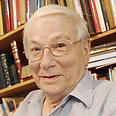
There is something ironic about the fact that one of Yoram Kaniuk's greatest novels was titled "The Last Jew." To a certain extent, Kaniuk considered himself the last Jew, who once again cannot find in modern Judaism – which links nationality to religion in the most complete way - his spiritual and cultural home. It can be said that in the years before his recent death Kaniuk considered himself to be the "first non-Jew." His soul was so strained by the interpretation, implementation and expression of Judaism in modern Israeli society until he declared 'this is not me' and asked to be registered as "without religion" at the Population Registry.
I can understand him. A secular Jew in the State of Israel in the 21st century recognizes and cherishes the Jewish tradition, which has accumulated so much wisdom, culture and thought, but feels alienated and frustrated in the face of all the national-religious interpretation in the country. This is not Judaism of thought, spiritualism and culture, but a clericalist, belligerent, conservative, zealous and racist entity whose religious fantasies grant legitimacy to cynical territorial expansion.
One can understand Kaniuk, when under the guise of "Jewish identity" legitimacy is given to discrimination, violence, coercion, oppression, distortion of democracy and control of another nation, and when in the Knesset they are trying to pass a bill that is meant to bolster Israel's "Jewish character" while what really needs strengthening is the country's democratic character and its identity as a country of all its citizens. By asking to be registered as "without religion," Kaniuk tried to undo the Gordian knot which ties religion and nationality together and place Israeli secularism at the forefront of his personal and national identity.
Israeli secularism does not throw away Jewish tradition, but it offers culture, priorities and emphases that are added to the Israeli identity. Even if it does not have an official status, Israeli secularism has a distinct character and presence. This identity also includes a significant component of choice: He who is born Jewish is a Jew always and everywhere. His national identity lacks the element of choice and he cannot attach to it a different religion. An Israeli, on the other hand, is someone who chose to live here, and belonging to something by choice has an added value which the automatic affiliation lacks.
Towards the end of his life Kanuik managed to convince the court to register him as someone "without religion," thus achieving what many in the secular public so desperately seek: The separation of religion and state, or religion and nationality. But his request that everyone be allowed to be registered as "without religion" was denied.
So, he passed away without achieving everything he had set out to do, but the courageous step he took is a legacy of sorts that he left to all those who feel and think as he did. His actions showed that there is hope: The State's authorities are conservative, cautious and hesitant by nature, and they adapt themselves to reality after the fact more than they actually shape reality.
Therefore, Kaniuk's legacy will be fulfilled in the near future. In the meantime, it is enough that it inspires and encourages all those who wish to place Israeli secularism at the forefront of their personal and national identity.
Dan Shavit is an author















